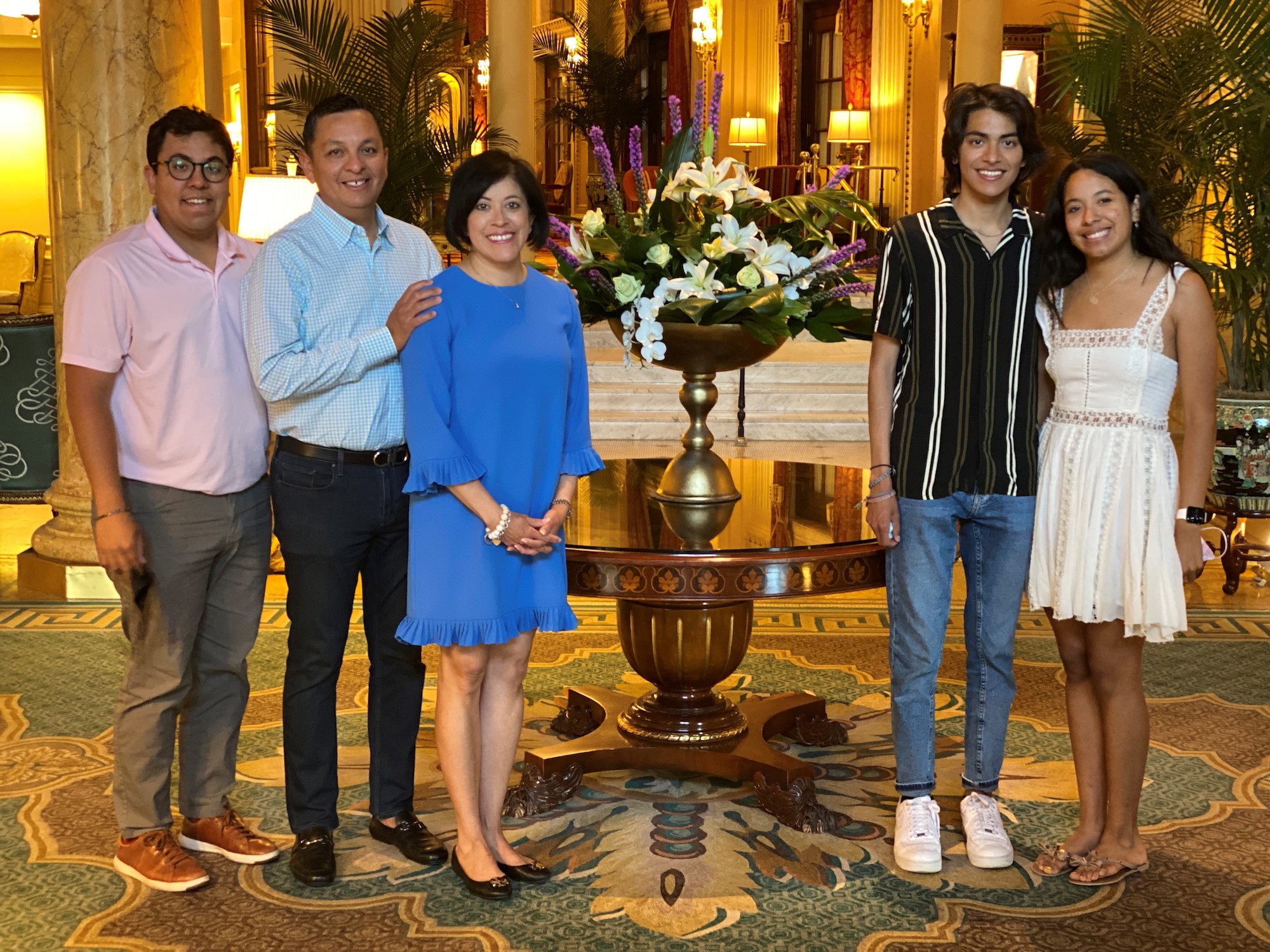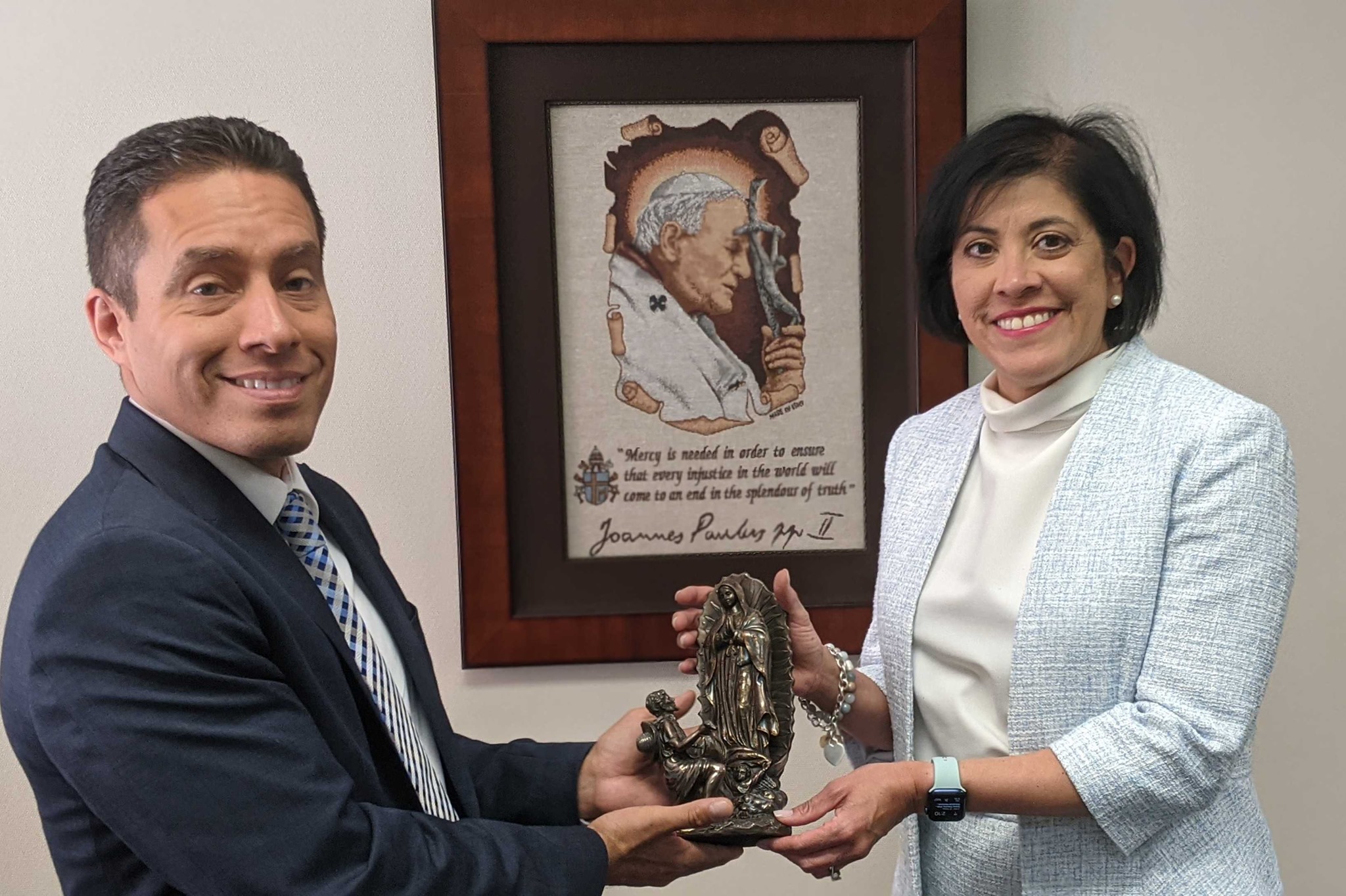
Dr. Maria Chavira, Chancellor for the Diocese of Phoenix, has taken on multiple leadership roles in her life. Her accomplishments were most recently recognized by the Tepeyac Leadership, Inc. honoring her with its “St. Juan Diego Leadership for the World” award in June. But she considers her primary role as a wife and mother.
“Out of all of those roles that I play, the most important one has been my role as a wife and a mother. It’s in those roles that has prepared me most,” Chavira said in an interview with The Catholic Sun. “My role as a mom is to gather all my children and help them understand the importance of their faith — along with my husband — and work with them, listen to what it is that they need and to help meet those needs.”
Connecting her vocation to her leadership role with the Diocese of Phoenix, she added: “The Church is very unique and diverse. What you try to do is you try to listen to what the needs are that each of the people of God are bringing, and always to have a listening ear and heart for what it is that they’re going through and try to move them along their faith journey.”
Out of all of those roles that I play, the most important one has been my role as a wife and a mother.
The award is given to Catholics who are “courageous about defending and promoting the values of our Catholic faith,” said Cristofer Pereyra, CEO of Tepeyac Leadership, Inc. Beyond her role as chancellor, he added, Chavira also sits on several boards and committees in the Greater Valley area, offering a Catholic perspective. Previous honorees include in 2019 Alan Sears, KCSG, the founder and former CEO of Alliance Defending Freedom, and in 2020 Arizona Supreme Court Justice Bill Montgomery.
“This is a woman who has really strived to become an influential and successful leader in her own field, not for her own sake, but to give God all the glory,” Pereyra said. “It is very apparent in her leadership style, which is servant leadership. She really embodies the spirit of what we’re trying to accomplish with TLI.”
Family life rooted in Jesus Christ
Born and raised in Tucson, the former Maria Romo met her future husband, now Dcn. William “Billy” Chavira while attending the University of Arizona. When his aunt passed away, Dcn. Chavira needed a ride to the airport.
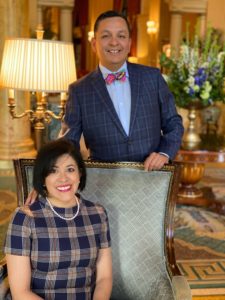
“She had an almost non-functioning car, with a hole in the bottom. She said, ‘Please say a prayer that my car starts.’ I was like ‘Who are you?’” laughed Dcn. Chavira. “We developed a friendship, and the root of that friendship was Jesus Christ. We were both blessed to find someone who really loved the Church.”
Maria would go on to earn a doctorate in educational psychology, while Billy became a pro-life obstetrician and gynecologist. The two got married in 1995 at St. Mary’s Basilica in Phoenix — where Dcn. Chavira’s parents were also wed. Before having children, the couple served as volunteer catechists for the confirmation program at Dcn. Chavira’s home parish of St. Anthony in Phoenix.
“Being able to do something in our faith together, that has always been something that has been part of our life,” she said.
Dcn. Chavira described his wife’s leadership style as a quiet one of self-sacrifice. He recalled her needing to have a Caesarian section for their first child, Michael, when she was supposed to be defending her doctoral dissertation.
“She went down and defended her dissertation and was breastfeeding in between her defense,” he said. “Her whole life is one of self-sacrifice.”
In addition to St. Anthony, the young family would also periodically worship at the Franciscan Renewal Center, or the “Casa.” As their family grew, they began attending St. Timothy Parish in Mesa — where Chavira served on the first school board for the new parochial school — and, eventually, St. Thomas the Apostle in Phoenix to be closer to St. Joseph Hospital in case her husband was needed for an emergency.
Chavira also has a unique vocation being the wife of a deacon. Primarily, she supports her husband’s vocation through prayer, though she also acts as a sounding board when he’s preparing his homilies, and she occasionally joins him with various ministries in the parish.
While he was going through formation, Dcn. Chavira remembers being outside the room while she was being interviewed when he heard a “roar of laughter” coming from inside. Maria had been asked about sharing her husband with the Church, or having “another woman” in his life. Her response, the deacon said, was that she’d been “sharing my husband with a different woman every night, and he still comes home, and we’re family,” referring to her husband’s work as an Ob/Gyn.
“When St. John Paul II addressed permanent deacons, he said the greatest gift the deacon can give the Church is to be an example of the family,” Dcn. Chavira said. “That’s what she’s tried to emulate. That’s the essence of a woman and true femininity — self-sacrifice and giving of themselves.”
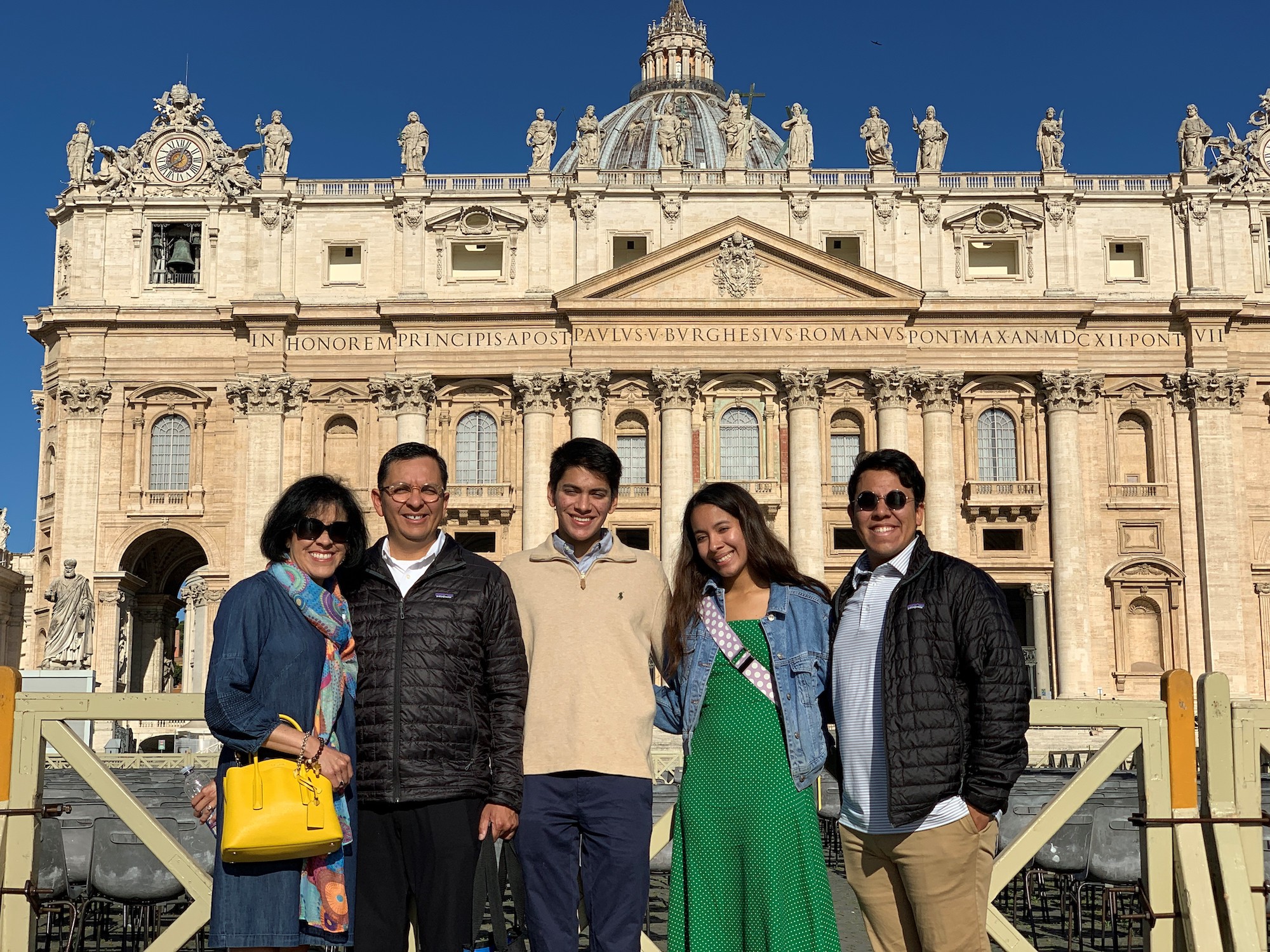
Advocate for students
After moving to Phoenix, Chavira initially worked for the Arizona Board of Regents assisting with academic and student affairs but, after two years, took on a faculty position with Mesa Community College’s Psychological Science Department, which allowed a more flexible schedule for a young mother.
Dr. Ly Tran-Nguyen, who worked alongside Chavira at Mesa Community College and is currently a tenured faculty member, isn’t surprised that the latter was recognized for her leadership. She served as department chair 2001-2002, and she volunteered to serve again from 2008-2009 when the Psychological Sciences Department was going through some turmoil, Tran-Nguyen said. In another instance, she was asked to serve as an interim faculty coordinator for the Maricopa Community College District’s Maricopa Institute for Learning.
“I think people recognized Maria’s ability to lead, and that’s why she’s always called on to assist in that manner,” said Tran-Nguyen, who also served as department chair from 2010-2015.
“When we worked together, not only were we colleagues, but she was a friend I looked up to. Knowing she was also a woman of faith, I trusted her counsel. We spoke often not only regarding things related to teaching and learning, but other aspects of life. I always looked to her as a mentor because she was a few years ahead of me in the faculty role.”
Chavira also advocated for her students, said Tran-Nguyen. She served as faculty adviser for the department, helped ensure courses would transfer to state universities and represented the psychology discipline at the district level. Even now, she continues to teach research methods as an adjunct faculty member.
“I’m speaking for our whole department — we value Maria and all that she does for our students,” Tran-Nguyen said.
During this time, Chavira was already deeply involved in the Catholic community, having served on the board of directors for the Catholic Community Foundation, including one year as the board’s chairperson.
“My favorite committee was the Christian Service Awards,” reflected Chavira on the annual scholarships awarded to middle school students planning to attend Catholic high schools. “We were able to interview young scholars for the award, and it was so much fun. The young people just gave you so much hope on where it is that the Church’s future leadership was going to be coming from.”
She and Dcn. Chavira are also both members of the Sovereign Military Order of Malta and the Equestrian Order of the Holy Sepulchre. The Order of Malta has as its mission upholding human dignity and caring for people in need, namely the sick, while the Order of the Holy Sepulchre supports Christians in the Holy Land.
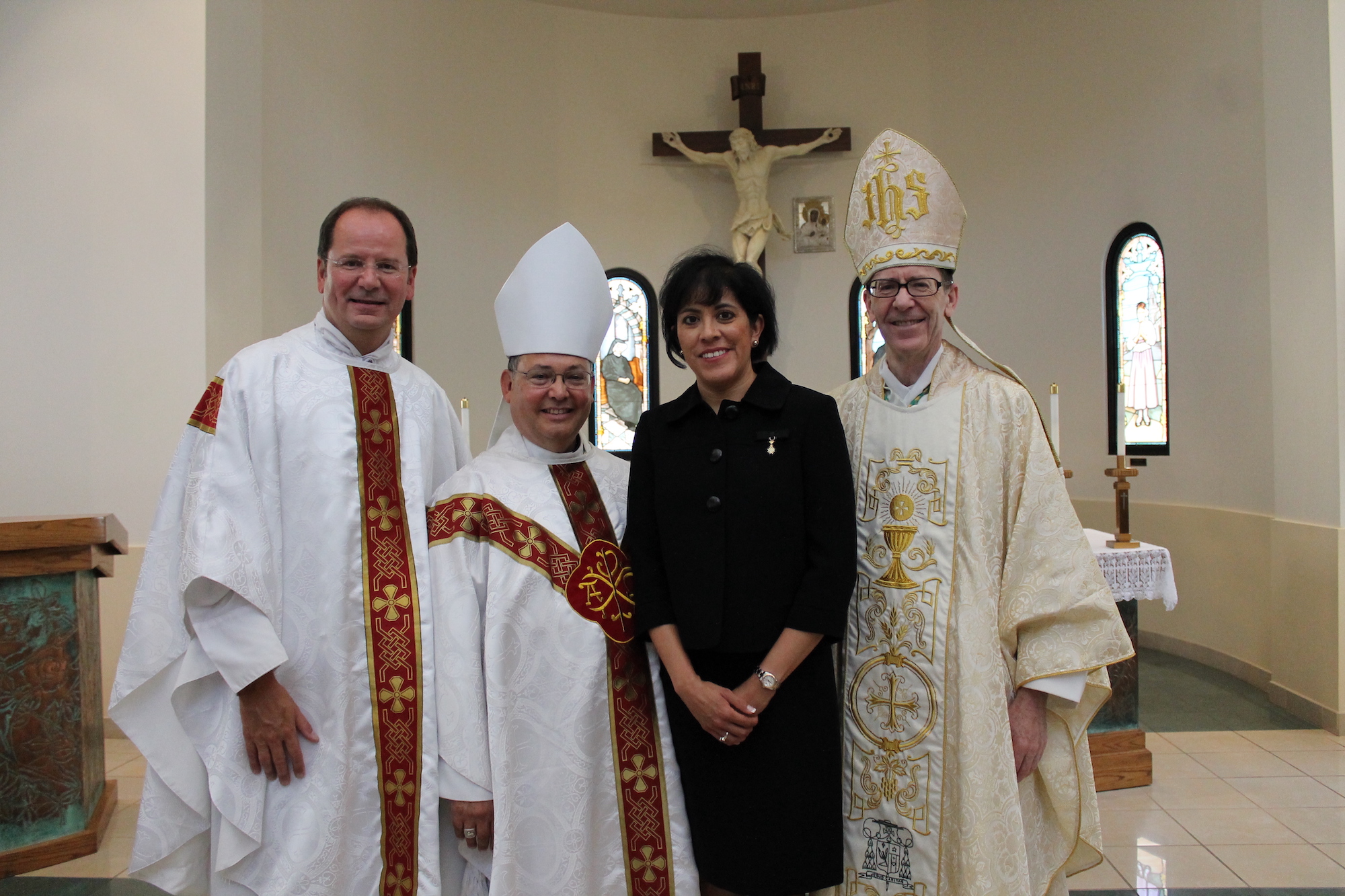
Lay leadership
When Sr. Jean Steffes, CSA, left the role of chancellor in 2013, diocesan leaders began discerning hiring a layperson, said Diocese of Phoenix Vicar General Fr. Fred Adamson. The position is typically held by a member of the clergy or religious life in many dioceses throughout the country.
“I wanted somebody who was a compelling witness of Christ, man or woman,” Bishop Thomas J. Olmsted said. “I wanted someone who had leadership abilities and who was articulate. I was aware of the leadership that the two of them had exercised in the Catholic community as a couple.”
She’s got the respect and accountability amongst her peers and other professionals.
According to the Code of Canon Law, a diocesan chancellor “must be of unimpaired reputation and above all suspicion” (483.2). The primary role of the chancellor is to act as a notary for a diocese’s official documents — such as decrees of appointment for pastors — and to oversee the diocesan archivist in maintaining important records, in addition to any other duties as required by the local bishop (482.1).
In the Diocese of Phoenix, this means that Chavira also oversees the Office of Prison Ministry, the Office of Consecrated Life, and special collections for the Catholic Campaign for Human Development, Catholic Relief Services and the Society for the Propagation of the Faith.
“Because she’s a native Arizonan and has been part of the Diocese of Phoenix since her marriage, she knows the parishes well, she knows the cultures well,” Fr. Adamson said of Chavira. “She’s got the respect and accountability amongst her peers and other professionals. That’s been a great gift to us.”
As the diocese’s record-keeper, she works closely with Fr. Adamson in planning and implementing policies — such as with development of safe environment processes. She also coordinates the diocese’s annual pastoral report and is a key member on the diocese’s communications team. She also serves as a key adviser to the bishop.
“She never just offers advice without prayerfully thinking it through. It’s based on someone who lives their faith 24 hours a day, but at the same time, as someone who does it as a professional,” said Bishop Olmsted. “I’m so thankful to God for her expertise and for her advice.”
As a laywoman, mother and wife, Chavira also offers a perspective that may not otherwise be heard, Fr. Adamson said.
“She’s a mother and a wife, and those are two very important characteristics and insights that are important for a chancery to have and for a bishop to listen to,” Fr. Adamson said. “She gives a viewpoint that we might not otherwise have on the leadership staff.”
Her background in quantitative research and analyzing statistics has helped the diocese understand the people better and how best to serve them, she said. She likened it to how Ven. Padre Eusebio Kino, the “Apostle to Arizona,” and Arizona’s first bishop Jean Baptiste Salpointe went out to the communities to understand their needs.
“I see that [data] as a tool for understanding what is it that our diocese looks like, where it is that our needs are,” she said. “It helps to provide a picture of where it is that we may want to pay special attention to.”
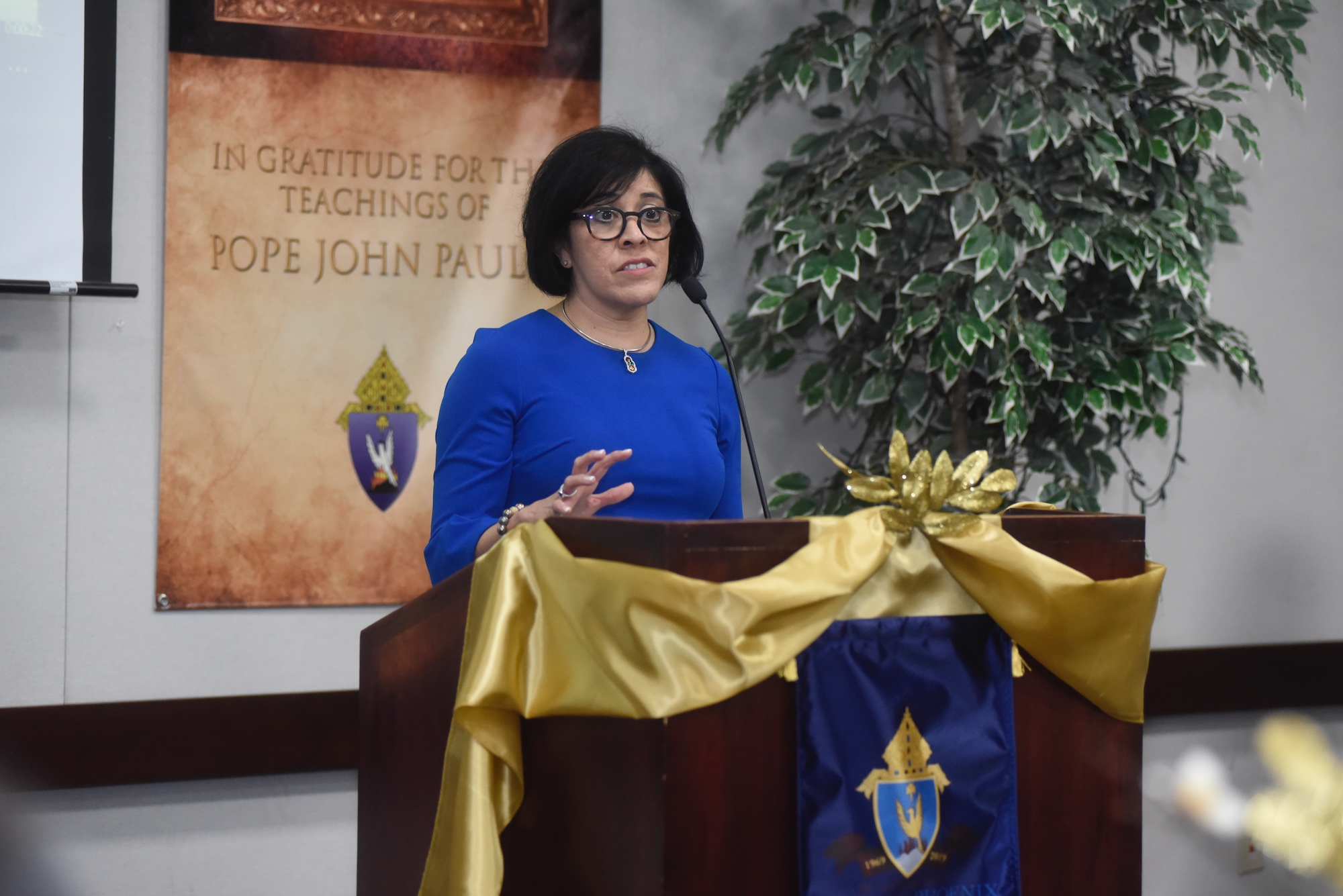
One example is her involvement with the diocese’s V Encuentro team that examined the needs of Hispanic Catholics in the U.S. today. This eventually led to the formation of the Catholic Schools Hispanic Advisory Council.
“Education for the Hispanic community is one of the biggest concerns,” she said. “If our Catholic schools are evangelistic, how is it that we can provide more opportunities for that demographic to be in our Catholic school,” she said, noting that the Diocese of Phoenix has a majority Hispanic population.
Chavira also co-chairs the diocese’s Racial Healing and Reconciliation Commission that Bishop Olmsted established in the wake of the civil unrest following the May 25, 2020, deaths at the hands of law enforcement officers of African-American men Dion Johnson in Phoenix and George Floyd in Minneapolis. In another example of understanding the needs of the community, that commission conducted a survey to better understand the sin of racism.
Building relationships
Chavira currently sits on the boards of directors for the Arizona Hispanic Chamber of Commerce and Downtown Phoenix Partnerships, as well as serving on the Maricopa County Attorney’s Community Advisory Board. She also served on the Arizona 2020 Census’s faith-based committee. For her, it’s a matter of continuing the long tradition of the Catholic Church working to better the community.
One of the amazing things about Dr. Chavira is she leads by example. It is a feeling and an energy that she brings to every conversation that is Christ-like in many ways.
“The Catholic Church was involved in developing our first hospitals and our first universities,” Chavira said. “It’s been involved in advocating for how it is that we better our society, and we’ve been a part of that.”
Chamber president and CEO Monica Villalobos said Chavira’s contribution to the chamber’s annual “DATOS” report — considered the most comprehensive compilation of research on the impact of Hispanics on the Arizona marketplace — to make sure that the narrative maintains the integrity of the data.
“One of the amazing things about Dr. Chavira is she leads by example. It is a feeling and an energy that she brings to every conversation that is Christ-like in many ways, and that’s why we’re able to do the great work we do,” said Villalobos.
Villalobos also considers Chavira a mentor for her, not only in the business world, but in family life, as well. Chavira’s influence has enabled Villalobos to integrate her faith in her work and to further her education.
“I’ve been inspired by her role as a wife and mother. I’m always amazed at her ability to not only be a community leader, but to balance that very well with her commitment to her family,” said Villalobos, who attends St. Thomas Aquinas Parish in Avondale. “Less than 1% of Latinas in the country have a doctorate. In pursuing my own education, she’s been a lighthouse at the end of the road and showing that is possible.”
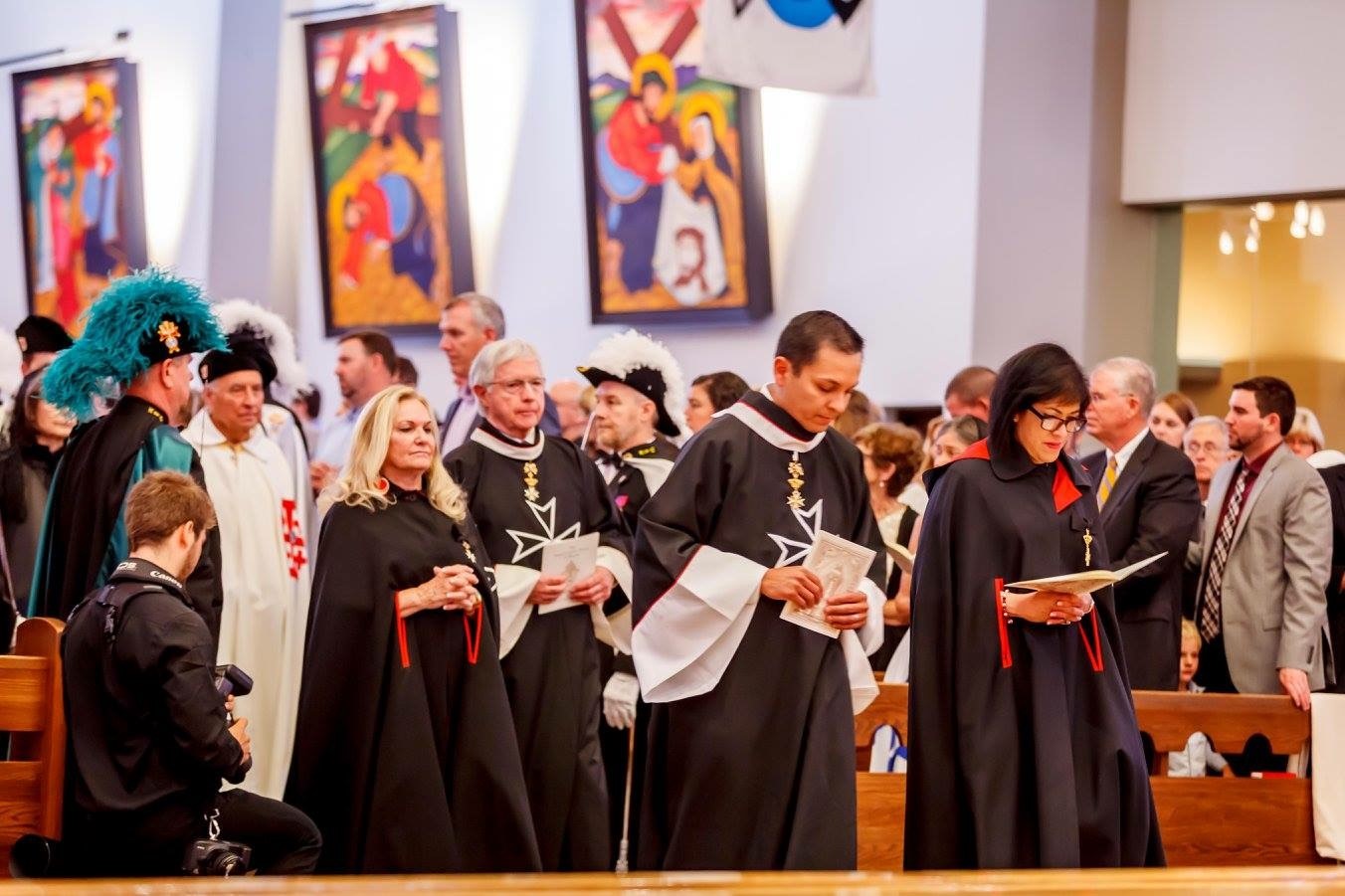
Grounded in prayer
Chavira, who attends adoration and the daily Mass celebrated in the Diocesan Pastoral Center chapel as often as possible, said she relies on prayer to keep her spiritually grounded as difficult situations arise. Every morning she’s in her office, she looks at an anonymous gift that sits on her desk — a framed picture of Bishop Olmsted celebrating Mass when she was installed as chancellor, along with a quote from his homily from that Mass: “No troubles will come that are too strong for the love of God and His Church.”
“I get a lot of phone calls sometimes that are difficult, and so I look at this,” she said, holding the picture, “and I remember that there is no trouble that will come that is too strong for the love of God and His Church. So, I turn those phone calls into prayer.”
Sometimes she’ll go to adoration at night when she knows there’s something important coming up that she wants to place it in His hands. Sometimes she goes, just because. She likens going to adoration to going to the beach and getting tan just by sitting in the sun.
It’s “the same thing as sitting in front of the Blessed Sacrament. Sometimes I don’t do anything, but I’m there, and I know that I’m being changed without even doing anything,” said Chavira. “Being in the presence of God is what is important.”



